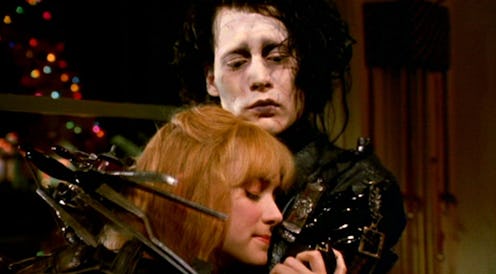Edward Scissorhands is not a movie that immediately pops into one’s head when thinking of Christmas movies. But the film, which was director Tim Burton and actor Johnny Depp’s first collaboration and celebrates its 25th anniversary this month, is, in this twisted writer’s opinion, one of the best Christmas movies out there. Unlike other Christmas classics, like It’s a Wonderful Life or Home Alone, which also celebrated its 25th anniversary this year, Edward Scissorhands is a Christmas movie for the quirky, the weird, the lonely, and those for whom Christmas has always been an awkward or uncomfortable time. In its own way, Edward Scissorhands makes the holiday a little more bearable for those who find the holiday decidedly not.
I happen to love Christmas, but I have plenty of friends for whom the entire month of December is one long slog through a holiday they hate. Obviously there are folks of varying religions who don’t observe the birth of Jesus or its secular shenanigans, but even among those raised on the annual Christian celebration, there are definitely some who don’t mesh with the holiday for a variety of reasons. Some find it alienating, either in that they’re not generally into holidays or don’t get along with their families. For some, it’s the loss of a family member around this time of year that shadows what is supposed to be a joyful time. But Edward Scissorhands manages to perfectly capture that loneliness, isolation, and family awkwardness that emerges around Christmas and repackage the holiday in a way that makes it easier to handle.
We all (hopefully) know the story: Edward Scissorhands tells of a typical suburban family whose lives are upended by the introduction of a man with scissors for hands (Depp). Put together, Frankenstein style by an old inventor (an awesomely creepy Vincent Price) who dies before completion, Edward lives alone in a Gothic mansion that looms over the candy-colored suburbia below. After being “rescued” by the Boggs family matriarch (Dianne Wiest), Edward falls in love with the family’s teenage daughter Kim, played by an appropriately melancholy Winona Ryder. From there, the poor, isolated Edward is only exposed to one culture clash after another; his good heart exploited by those who would use his kindness to their own advantage.
The film doesn’t begin at Christmas time, but it ends there, with the plastic tchotchke overload reflecting the town's folks’ materialism, and Edward sentencing himself to perpetual isolation atop the macabre mountain. But in that isolation, Edward finds his own peace, and continues to create snow for the town throughout the rest of Kim’s life and beyond. This may seem like a sad ending, and experiencing sadness can be quite a cathartic thing, but it doesn’t necessarily have to be taken that way. While Burton and his films have always celebrated the peculiar and the odd, they’ve also always embraced the idea that it’s perfectly OK to be so. If anything, Edward Scissorhands was the first in a long line of Burton films the explore being different and offer an oasis for those who have always felt that they just don’t quite fit in.
Edward Scissorhands takes these awkward feelings and makes them bearable, makes them understandable, and manages to do so in a stunningly beautiful film. Burton's visual style here is at its peak. Both he and Depp, having just started out together, haven't gotten into their now-criticized repetitiveness, and managed to create a bizarre world with a just enough basis in harsh reality and a "monster" of a character with more humanity than any of the so-called normal characters. And who can forget Danny Elfman's gorgeous score? The very image of Ryder dancing in the show to that music brings tears to my eyes.
For many, Christmas is one of the hardest times of the year, and frankly, joyful movies don’t represent everyone, especially those who have a difficult time at the holidays. But Edward Scissorhands, with its social commentary on acceptance of differences, can actually provide a bit of solace in the wintry wonderland. Through the touching story, stunning visuals, and moving score, the film offers a ray of light that suits the weird, lonely, and awkward moments many of us have experienced. And that's something worth celebrating.
Images: 20th Century Fox (3); Giphy
